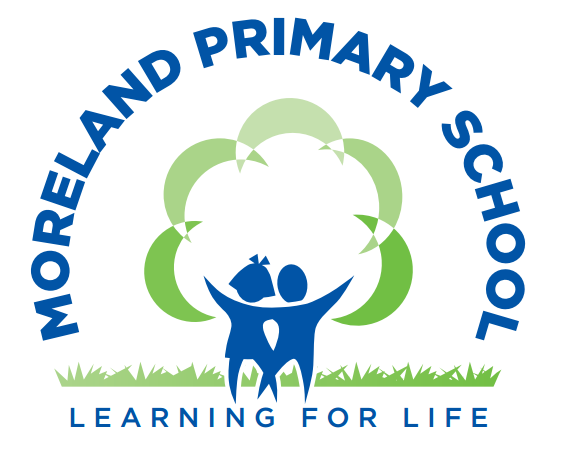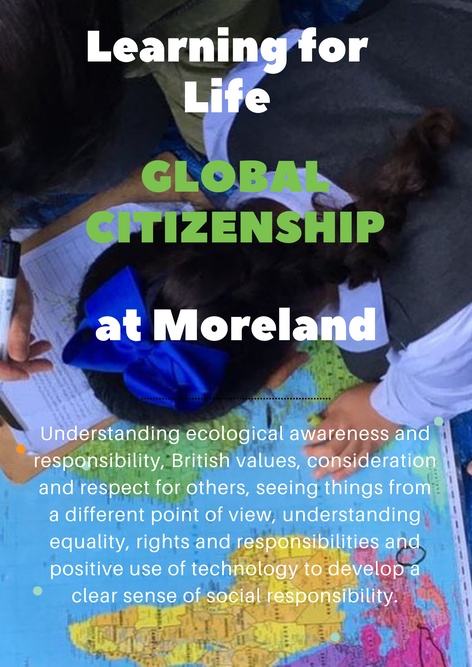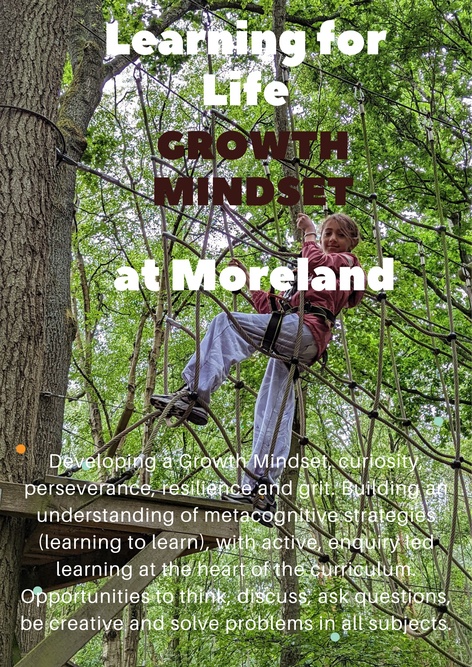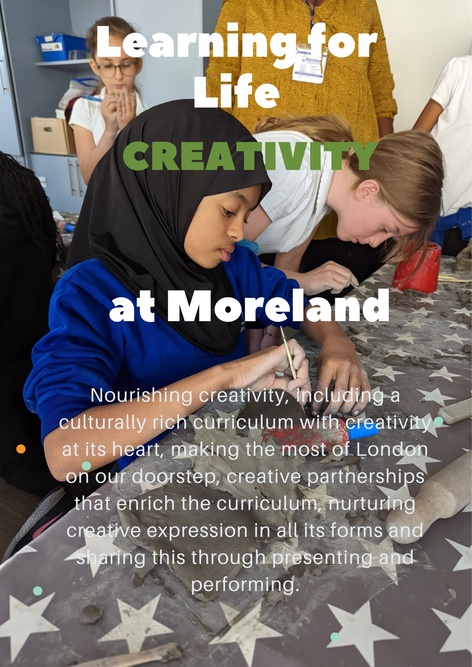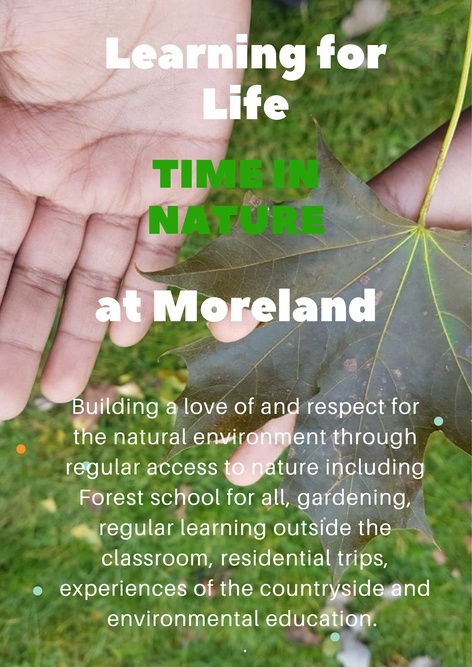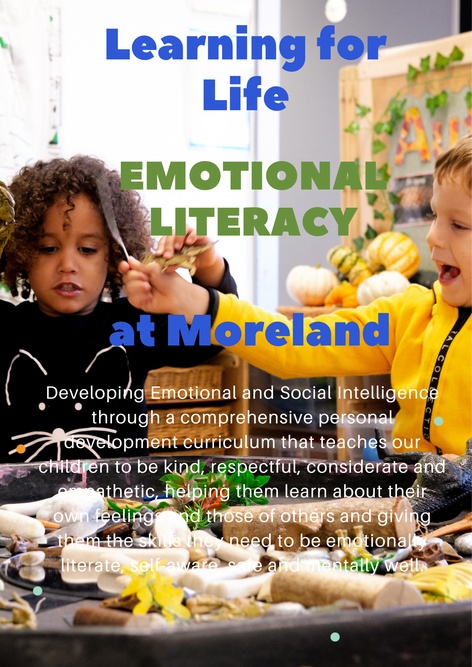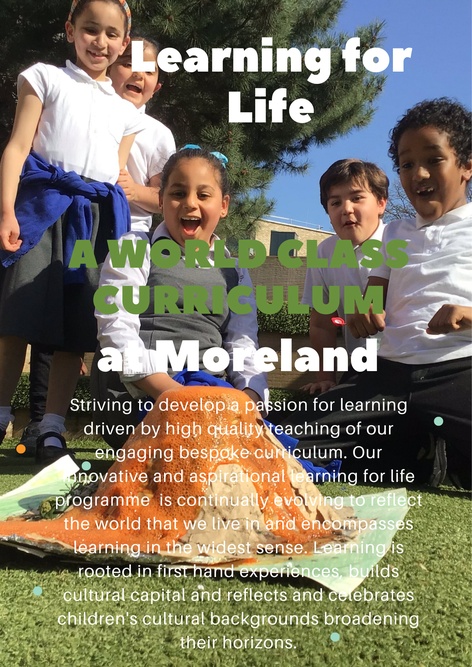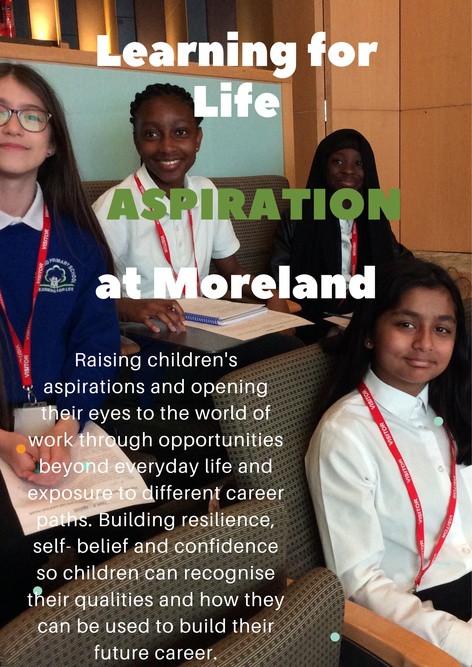Curriculum Overview
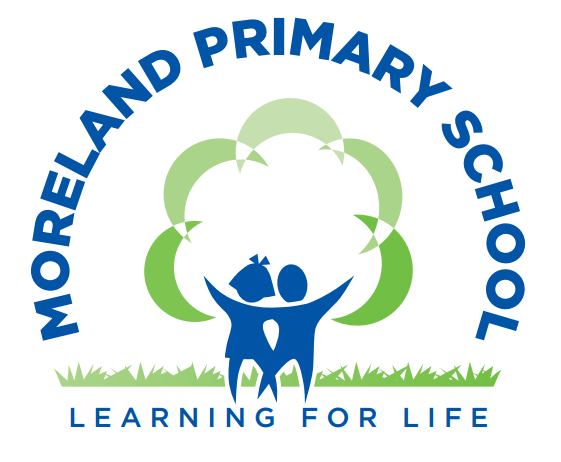
Learning for Life at Moreland
Learning is the purpose of the whole school and is a shared commitment. At Moreland Primary School and Children’s Centre we recognise that education involves children, parents, staff, governors, the community and the local authority, and that for optimum benefit all should work closely together to support the process of learning. Working in partnership, we aim to:
- provide a compassionate, supportive, positive, healthy, caring and safe environment, in which children can develop their sense of self, make mistakes and explore and have access to the support they need to succeed.
- support children’s wellbeing through modelling and teaching emotional literacy and self-regulation, an understanding of how their brain works and how to manage the emotions they experience enabling children to develop self-esteem, self-worth, positive emotional well-being and be empathetic to other people.
- create a school culture which has high expectations and values all members of the school community; where everyone is compassionate, shows respect for others, values difference and diversity, has a sense of belonging and is able to work collaboratively
- recognise the needs and aspirations of all individuals and provide opportunities for all pupils to make the best possible progress and attain the highest personal achievements; so that all pupils are aspirational for themselves, have a sense of their own potential and know how they can succeed in what they want to achieve
- challenge and overcome barriers caused by inequality through a culturally expansive curriculum; that promotes children developing a love of the arts and finding pleasure in creating and experiencing different art forms and provides opportunities to build cultural capital through multiple and diverse experiences of museums, galleries, theatres, concerts and exhibitions;
- ensure children can develop as competent learners, who are literate and numerate, digitally and technologically literate, are able to think critically and creatively and have the skills to find things out, ask questions, solve problems, reason, analyse and debate within a broad, balanced, exciting and challenging curriculum, that is relevant to their lives, reflects and celebrates their cultural background, broadens their horizons and is rooted in first hand experiences;
- provide rich and varied contexts and experiences for pupils to acquire, develop and apply a broad range of knowledge, skills and understanding; that encourages them to be curious, have a thirst for knowledge, make connections between things they have learnt about and apply their learning in different contexts;
- develop individuals with resilience, grit, determination and a positive Growth Mindset who have the confidence and capacity to learn and work independently and collaboratively;
- develop confidence and pride in their achievements through the chance to perform, exhibit and share their learning with a range of audiences through concerts, exhibitions, dramatic productions, social media, inter- school competitions and publishing their work;
- encourage children to respond positively to the opportunities, challenges and responsibilities of a rapidly changing world; develop an understanding of the challenges and opportunities of global citizenship in the 21st century including responsible use of technology and environmental sustainability;
- provide opportunities for children to take part in democratic processes and express their views in a meaningful way that is listened to and has influence on decision making; encouraging children to become active and responsible citizens, with the tools to participate in a democratic society and contribute positively to the community and society.
- provide regular time to learn and be outside, experience natural environments and visit green spaces including Forest School; to build in children, a love of and respect for nature, a desire to spend time in natural environments and a sense of responsibility and care for our planet.
- develop over- arching and enduring values of compassion, empathy, respect, responsibility, honesty, aspiration, equality, integrity, tolerance, fairness and trust;
As a school, we are committed to our mission statement – “Reaching higher than I dreamed, becoming the person that I can really be, doing the best that I can for the world and for me!”
We are committed to creating a learning culture where every child succeeds as we provide an inclusive education within a culture of high expectations. We endeavour to build on what children already know, making learning an enjoyable, valuable and challenging experience. Our school ‘family’ works to create and maintain a welcoming, calm, supportive and safe learning environment in which every person is valued, which enables them to achieve their maximum potential. We are committed to enriching the learning experience by creating and promoting learning skills across the curriculum. The school’s vision includes enabling children to become ‘Learners for Life’, which is an integral part of all that we do.
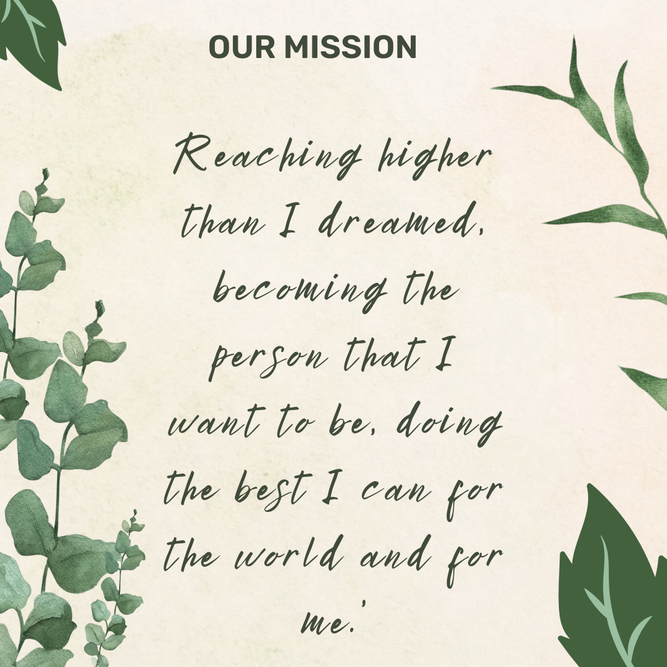
Curriculum Statement 2023-24
At Moreland, our aim is to provide the very best education and the most exciting opportunities to inspire our children. The curriculum we offer is bespoke and is based upon our ‘Learning for Life’ vision which is central to every decision we make.
Our inspiring curriculum is all about developing creative, critical thinkers with access to rich embedded knowledge who are equipped with the confidence, ability and desire to make the world a better place. Children are given opportunities to develop their knowledge, understanding and skills through:
- A foundation of solid reading, writing mathematical and digital literacy knowledge, understanding and skills that enables children to fully access the broad curriculum and have the skills they need for the next stage in their education.
- A well planned and sequenced curriculum that ensures children leave primary school having covered all aspects of the National Curriculum with the embedded disciplinary knowledge and skills necessary to be successful at Secondary school.
- An understanding of global citizenship in the 21st century including ecological awareness and responsibility, British values, consideration and respect for others, seeing things from a different point of view, understanding equality, rights and responsibilities and positive use of technology that helps develop a clear sense of social responsibility.
- Building aspiration and effective learning characteristics including learning for life, exposure to jobs and careers and experiences of the working world, opportunities beyond everyday life for all children, developing a Growth Mindset, resilience and confidence, the ability to self- regulate and an understanding of metacognitive strategies (learning to learn), active and enquiry led learning at the heart of the curriculum with opportunities to think, discuss, ask questions, be creative and solve problems in all subjects.
- Developing social and emotional intelligence through a comprehensive personal development curriculum that teaches our children to be kind, respectful, considerate and empathetic, helping them learn about their own feelings and those of others and giving them the skills they need to be emotionally literate, self-aware, safe and mentally well.
- Equality of access to the arts and nourishing creativity including a culturally rich curriculum with creativity at its heart, making the most of London on our doorstep, creative partnerships that enrich the curriculum, nurturing creative expression in all its forms and all children learning an instrument and performing regularly.
- Access to nature including Forest school for all, regular learning outside the classroom, residential trips and the opportunity to complete the National Trust’s 50 things to do before you are 11 ¾
We use adults within the school, in the community and beyond and children as role models to capture interest and show what is possible with focus and hard work. We work with parents and families to enhance our curriculum and ‘learning for Life’ so dreams really can come true!
Moreland Learning Values
Curriculum Structure and Schemes of Work
Core Subjects
English:
The teaching of English is at the heart of our learning and teaching and is essential to every area of the curriculum. We aim to develop a child’s love of reading through widespread reading for enjoyment. We promote and encourage children to discover the value of strong communication skills and the importance of reading and writing in all aspects of their futures.
In the EYFS, children are exposed to Literacy right from the start through sharing books with adults, listening to, learning and performing nursery rhymes, songs and stories. We recognize that literacy skills are dependent on communication skills and there is a strong focus on the development of listening and attention, understanding and speaking. Children who have delayed language skills are identified early and additional support is put in place to help them to catch up.
The EYFS environment offers a literacy rich environment promoting engagement with reading and writing across the curriculum both inside and outside. Systematic phonics teaching is introduced from Nursery through the Little Wandle Phonics Programme and children are supported in developing their reading skills using books that are matched to their phonic knowledge. Children are given opportunities to develop their gross and fine motor skills in preparation for writing from the Baby Room upwards.
There are numerous activities and resources that promote mark making and when ready children are introduced to letter formation through direct teaching of handwriting. A love of writing is promoted through giving children opportunities to write for a variety of purposes throughout the environment. In Reception more structured activities support children’s writing development alongside these other opportunities.
Throughout Year 1 to Year 6 Literacy is taught through a Whole Book Approach. This is an immersive approach to teaching English, allowing for connections to be made to all other areas of the English curriculum. Each year group is taught via class novels/books that are used by the class teacher to underpin the teaching of all aspects of English – speaking, listening, reading and writing. This allows children to study a genre for deeper understanding before applying their knowledge to create their own written pieces. The book will be linked to other curriculum subjects to foster a cross-curricula approach to learning. English is taught 4 days a week.
Phonics:
We place a strong emphasis on phonics teaching from Nursery to Year 2 because we believe this lays the foundations for successful reading. Teachers follow the Little Wandle Phonics scheme to deliver the learning. Phonics is taught every morning in these classes. Children are regularly assessed for progress to ensure all children are continuously taught to their individual needs. Children in KS2 who did not pass their phonics screening at the end of KS1 are given additional phonics support. Phonics is taught daily in Nursery to Year 2. Children still receiving phonics in Year 3 to 6 receive catch up sessions three times per week.
All children from Nursery to Year 2 take home or access online a decodable reading book appropriate to their needs and matched to their progression through the phonics scheme to practise their reading at home with parents and family. This also applies to children in Years 3 – 6 who need additional reading support.
Daily Supported Reading:
In Year 1 and Reception (and in Year 2 where still needed) we use an adapted Daily Supported Reading Programme alongside phonics for teaching reading. The Daily Supported Reading method has a proven track record of raising reading attainment in KS1 and Reception. Children read in ability groups 3-4 times a week with an adult using phonetically decodable reading books from the Little Wandle phonics scheme matched to their developing phonic knowledge. This instils good reading routines and practise from a young age and helps all children increase their enjoyment and maximize their progress in reading.
Whole Class Reading:
All children from Years 2-6 have a Whole Class Reading lesson four times a week. Comprehension skills develop through pupils’ experience of high-quality discussion with the teacher and their peers using a rich range of stories, poems and non-fiction. Children are exposed to texts with challenging or new vocabulary and words they would rarely hear or use in everyday speech. Whole class reading is based primarily on the English Core text but also includes other poetry, fiction and non-fiction texts linked to learning in History, Geography, Science, Global Citizenship and Science.
Spelling:
We use the No Nonsense Spelling Scheme to teach spelling. Children are given weekly spellings to practice at home from the appropriate year group National Curriculum Spelling lists.
Handwriting:
The school teaches handwriting using the Letterjoin scheme which children can also access at home.
Spelling and handwriting are taught three times per week on rotation.
More information can be found in the Curriculum Statement for English, including approaches to teaching Reading, Writing, Spelling and Handwriting
Maths:
At Moreland we want our children to receive a high quality mathematics education that ensures all pupils are fluent in the fundamentals of mathematics, have the ability to reason mathematically and can apply their knowledge and understanding to solve problems. We also want them to have an appreciation of the power of mathematics and a sense of fun and curiosity about the subject.
In Nursery we have developed our own scheme based on the NCETM Early Years progression and in Reception we use White Rose as a structure supported by resources from the Numicon Firm Foundations Scheme. In Years 1-6 we follow White Rose as a mastery approach to teaching maths. White Rose Maths - our chosen Maths scheme - uses accessible workbooks to introduce concepts in a highly scaffolded way through concrete, pictorial and abstract learning. It also provides children with many opportunities to develop their reasoning and problem solving skills. This enables children to develop critical thinking skills, make mathematical connections and become confident mathematicians. Maths is taught daily with 1 lesson per week focusing on number fluency.
In order to support children to develop mathematical fluency, children receive regular times tables practice at school and home using Times Tables Rock Stars. All maths lessons start with a ‘Flashback 4’ calculation practice including a daily word problem. This enables daily retrieval practice and consolidation of key skills.
Science:
In the EYFS Science is covered in the ‘Understanding the World’ area of the EYFS Curriculum. It is introduced indirectly through activities that encourage every child to explore, problem solve, observe, predict, think, make decisions and talk about the world around them.
During their first years at school our children will explore creatures, people, plants and objects in their natural environments. They will observe and manipulate objects and materials to identify differences and similarities. They will also learn to use their senses noticing and describing what they see, feel, smell, touch and taste. They will make observations of animals and plants and explain why some things occur and talk about changes. Children will be encouraged to ask questions about why things happen and how things work. Children will also be asked questions about what they think will happen to help them communicate, plan, investigate, record and evaluate findings.
In Years 1-6 we teach Science using the Switched on Science scheme of work. We aim for children to be fully immersed in their scientific enquiry and learning and develop a sense of excitement and curiosity about Science. Science lessons are practical allowing children to work and think scientifically and children participate in experiments and investigations, answering scientific questions as part of the curriculum. Children are taught essential aspects of the knowledge, methods, processes and uses of science. Through building up a body of key foundational knowledge and concepts.
There are regular opportunities for children to read texts linked to Science topics during Whole Class Reading allowing children to extend their background scientific knowledge, learn about the history of scientific discovery, new scientific discoveries and applications, key figures in Science and reinforce new scientific vocabulary. Children are given opportunities to write up science experiments and scientific reports.
There are many enrichment opportunities linked to the Science Curriculum including visits to places such as The Science Museum, The Garden Classroom, , The Natural History Museum, London Zoo, City Farms, Highgate Woods and The Royal Observatory. Children also take part in science based workshops in school and share their scientific learning through a Science Fair to celebrate British Science Week. We provide children with insight into careers in STEM subjects through Dream Catcher Assemblies and links with organisations such as Inmarsat, City University, The British Antarctic Survey and 3 Discovery.
Foundation Subjects
We study the separate subject disciplines for the Foundation Subjects, however, we have a joined up approach to the curriculum for Geography, History, Art and DT (with strong links to the English curriculum also) to allow children to re-enforce their knowledge and make links in their understanding. We follow separate schemes of work for RE, PSHE, Computing, Music, and Spanish making links to other subjects where appropriate. Topics of study have been carefully selected so that there is full coverage of the National Curriculum, opportunities to explore ideas in depth, revisit and expand upon previous learning and make links between subjects. In English children study quality books, plays and poems that are chosen to deepen children’s understanding of the focus topic. All units of study are built around planned practical learning opportunities such as field work, museum visits and workshops that enrich children’s learning further. We take full advantage of our location in the heart of London through curriculum topics that explore the richness of London past and present and Moreland is proud to be the Museum of London’s champion school. The organisation of the curriculum in this way helps knowledge to “stick”, to join up learning and ensure breadth and depth in the study of all subject disciplines. All children are also taught Philosophy for Children (P4C), Global Citizenship and Emotional Literacy in addition to the National Curriculum subjects offering a broad curriculum that prepares children for life and the next stage in their learning. We use the following schemes of work:
History – Bespoke school designed scheme of work (using some Key Stage History Units)
Geography – Bespoke school designed scheme of work (using some Royal Geographical Society Units)
Computing – Islington scheme of work
Art – Bespoke school designed scheme of work (using some Access Art Units)
DT – Bespoke school designed scheme of work (using some Kapow DT Units)
Music – EYFS and KS1 Jolly Music, Years 3 and 4 Jolly Music, Years 5 and 6 Kapow Music. All classes follow a bespoke school designed music appreciation scheme of work.
PE – Complete PE Scheme of Work plus intensive swimming courses in KS2 at the local swimming pool.
RE – Islington scheme of work
PSHE – Islington scheme of work
Spanish – Adapted Language Angels Spanish in Years 3 and 4. Bespoke school designed scheme of work in Years 5 and 6.
More detailed information can be found in the curriculum statements on the website subject pages below and individual subject policies for each subject.
For more information on the EYFS curriculum and how this links with the KS1 and KS2 curriculum, see the EYFS curriculum section and the individual subject progression maps.
Key Skills and Competencies
Key skills and competencies give children the means to successfully unlock learning and ensure they are prepared for the next stage of education. The 5 key competencies that we focus on are:
- Communication – understanding and communicating ideas
- Creativity – thinking outside the box
- Critical Thinking – solving problems
- Collaboration – working with others.
- Compassion - caring for others
A portrait of a Moreland Child
When a child leaves Moreland at the end of Year 6 we aspire for them to have developed the following characteristics:
| Expected characteristics | How do we deliver these? |
|---|---|
|
|
|
|
|
|
|
|
We believe this approach will embed the school’s ‘Learning for Life’ ethos and support the development of happy children who are ready for the next stage of their educational journey, have high aspirations for themselves and a strong sense of respect and belonging for their community.
Written by Catherine Lawrence July 2020
Update September 2023
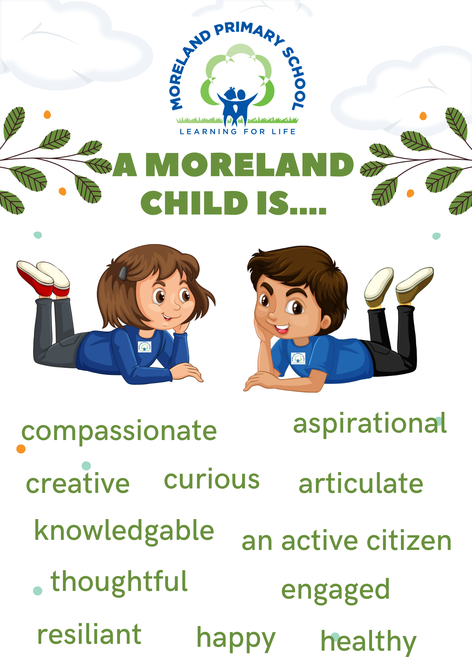
SEND Curriculum Statement
At Moreland we believe all pupils should have the opportunity to learn to the best of their capabilities through a broad and balanced, inclusive curriculum. This means that every child, including those with SEND should have access to a high standard of teaching. Teachers give every child the opportunity to experience success in learning and to achieve as high a standard as possible. All teachers take account of their duties under the Equality Act 2010 to ensure that they meet the full range of children’s needs including the protected characteristics. Our aim is that every child is prepared for their next class and stage in education and we have high expectations of them all and for them all.
Teachers plan lessons to respond to pupils’ diverse learning needs and ensure that there are no barriers to every child achieving. Reading is a strong focus as we endeavour to get every child to age-appropriate level and fluency where we can. In many cases, this will mean that all children will be able to access the full National Curriculum and the EYFS curriculum. However, for some children with SEND, we scaffold their learning and use different approaches and additional resources in line with our school-based interventions. Some children have particular learning and physical individual requirements and require a personal, more individual curriculum which is relevant to their development and learning needs. For most children this is based on what the rest of the class are learning but for some children with more complex needs it is more individual. However, our aim is that we do not offer children with SEND a reduced curriculum. We want every child to know more, remember more and be able to do more. We take advice from external professionals in these cases like The Bridge outreach team, Samuel Rhodes outreach team etc. We also work in full partnership with parents so they can reinforce learning at home.
Our school has a clear approach to identifying and responding to children with SEND. We recognise the benefits of early identification – identifying need at the earliest point and then making effective provision to improve the long-term outcomes for the child. We regularly review and evaluate the quality of the support we offer and the progress made by the children in our Pupil Progress meetings. Link SEND governors attend at least one of these meetings a year.
Further details can be found in the following policies within our Policy Section:
SEN Policy
SEN Information report
Accessibility Plan
Single Equality Plan
